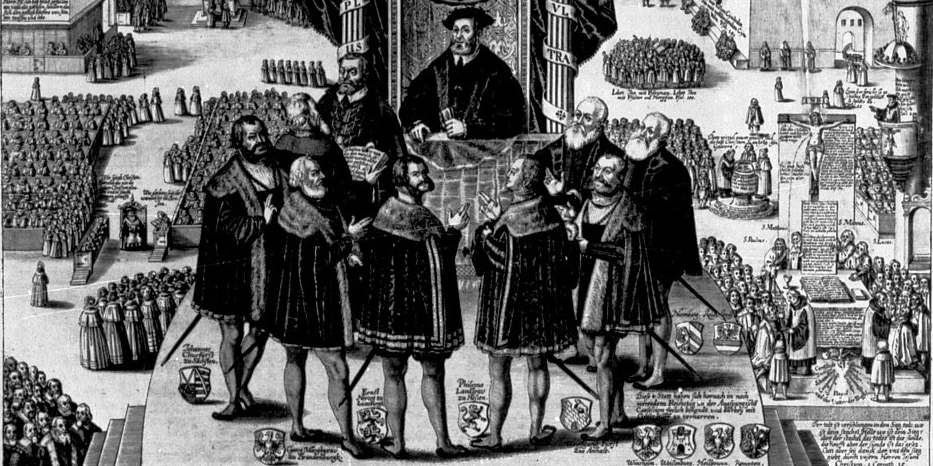
You Are Righteous before God by Faith.
Presentation of the Augsburg Confession – Pr. Faugstad homily
On June 25, 1530, the Lutheran princes of Germany stood before Emperor Charles V in the German town of Augsburg and publicly read their confession of faith. They stated that they would rather die than compromise the truth of God’s Word.
Text: Romans 10:5-17
In Christ Jesus, whose perfect confession of the truth covers over our times of doubt, weakness, and faithlessness, dear fellow redeemed:
In the parts of the Augsburg Confession we have heard so far, there are two major themes that are brought up again and again. Those themes are righteousness and faith. In the Bible, “righteousness” is what it takes to be right with God. We don’t have to guess about the standard, because God has given us His standard for righteousness. He has given us ten statements—Commandments—which outline a life of righteousness.
Just ten commands—if you can live by them and keep them, you are right with God. But if you cannot keep them, then you cannot make yourself right with God. Already in the second article of the Augsburg Confession, the Reformers said this: We condemn those who “argue that a person can be justified before God by his own strength and reason” (ELH p. 9). In article four, they repeated the same thing, “We teach that men cannot be justified before God by their own strength, merits, or works” (ELH p. 9).
This teaching that there is nothing we can do to make ourselves right with God does not shock us, but it certainly shocked the people in Germany and beyond in 1530. Many believed that their good works, their merits, did contribute to their righteousness before God. The Roman theologians who responded to the Augsburg Confession put it like this, “All Catholics admit that our works of themselves have no merit but God’s grace makes them worthy to earn eternal life” (“The Confutation of the Augsburg Confession” in Sources and Contexts of The Book of Concord, p. 109). So is it ultimately God’s power or our power? Is it His work or our work?
St. Paul does not leave this ambiguous or unclear in today’s reading. He writes about “the righteousness that is based on the law” and “the righteousness based on faith.” The righteousness based on the law is our attempts to do what God tells us. If we kept His Commandments perfectly, He would let us into heaven because of our own good work. But if we have not kept them perfectly, we stand condemned in our sin. It’s all or nothing. Either you are perfect according to God’s standard, or you are not.
Now “the righteousness based on faith” is not a different kind of righteousness. It is still the perfect keeping of God’s Commandments, but this righteousness comes to us apart from our works. We do not earn this righteousness; we are given this righteousness. It is the righteousness of Jesus, who did perfectly keep the Commandments. He is the only human being to accomplish this. We were all conceived and born in sin, and we continued sinning. But He was conceived in the virgin Mary’s womb by the power of the Holy Spirit, and therefore He entered the world without sin.
Though in every respect He was tempted as we are, He never sinned (Heb. 4:15). He perfectly feared, loved, and trusted His heavenly Father. He perfectly loved everyone around Him. And that perfect keeping of God’s law is counted to each one of you by faith, and faith alone. Again from the Augsburg Confession, article four: “We teach that men… are freely justified for Christ’s sake through faith, when they believe that they are received into favor and that their sins are forgiven for Christ’s sake, who by His death has made satisfaction for our sins” (ELH p. 9).
For this faithful confession before one of the most powerful rulers in the world, the Reformers were risking their very necks! They were willing to die for this truth. They were fully convinced that what St. Paul wrote is true: “if you confess with your mouth that Jesus is Lord and believe in your heart that God raised Him from the dead, you will be saved.” Paul says nothing about God’s grace making us worthy to earn salvation, or about faith working through love that somehow earns us heaven. He speaks of the righteousness of Jesus becoming ours by faith in Him.
But where does faith come from? Is that a work you do? Paul writes, “So faith comes from hearing, and hearing through the word of Christ.” The power to save you and to work faith in you is in the Gospel, the good news of Jesus’ perfect life and atoning death on behalf of sinners. That is why you can be certain of your righteousness and salvation. They are gifts from God to you, received through the faith the Holy Spirit worked in you through the Word.
God has saved you. He justifies you. He caused you to believe this soul-saving truth. You Are Righteous before God by Faith. This is what the Lutheran laymen and pastors confessed 494 years ago, and by God’s enduring grace, we still confess it today to His glory alone. Amen.
+ + +
(picture of Emperor Charles V receiving the Augsburg Confession)
